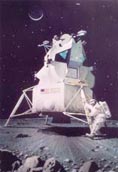|
Flying Off The HandleTM
Commentary
November 2014
Is it time for HUDs for Smartphones?
By Carlton W. Austin
The aviation and space domain—like virtually every other area of life these days—is rife with acronyms. And, yes, HUD is an acronym having its origin in aviation. But I’ll bet you didn’t know that the “SMART” in smartphone was an acronym too. More about both in a moment.
First, are smartphones really smart? Well, yes. Today, as famous theoretical physicist Dr. Michio Kaku has written, “Your cell phone has more computing power than all of NASA in 1969, when it placed two astronauts on the moon.” And as a piece in The Independent1 notes, “Smartphones will, among other things, tell your Facebook friends that you're hangover is as bad as predicted, transmogrify into a wind instrument known as an ocarina, and recognize the Abba track you heard on Mamma Mia!, download it from the Internet and play it. And that's on top of the functions we've come to expect from our mobiles – things like texting, telling us the time and, say, phoning people.”
But are they making us smarter? More productive? Happier?
It is an eternal truism that every new invention, indeed all new knowledge, is a double-edged sword. The benefits and pleasures derived must be balanced against the unintended consequences that always present themselves.
Today there are at least 1.75 billion smartphones in use globally. About two-thirds of Americans own one. Research done in 2013 and reported in the Daily News2 revealed that “[Smartphones or tablets] are checked on average 150 times a day -- once every 6.5 minutes…. Gaming has become the single most popular activity over the past 12 months, accounting for 43 percent of usage, followed by social networking (26%).” And notably, from a utilitarian perspective, “At the other end of the scale, productivity (2%) and health and fitness (1%) appear to be the least popular ways to use a mobile device.”
Not surprisingly, the two biggest areas of use are the areas critical to the negative impacts of this technology: gaming and social networking.
And, as it turns out, the gaming aspect of smartphone use is the key to both.
In a 2008 Atlantic3 magazine article writer Nicholas Carr presciently asked whether the Internet is making us stupid. He reflected that “What the Net seems to be doing is chipping away my capacity for concentration and contemplation.”
He was right. The inability to focus is the key.
Smartphones provide the same addictive gratification that slot machines do, because they both exhibit the most potent behavioral initiator known. Called a variable ratio schedule, it basically means you know you will get a reward for a certain behavior (checking your phone), but you don’t how many actions it will take to get the reward (a new email, text, Facebook update, etc.). The reward itself is also variable (just SPAM? or a comforting note from a treasured friend?).
Remember, phone checks, on average, every 6.5 minutes!
There are those who argue that the brains of smartphone users are not being turned to mush. And I would agree. Because it’s not that our collective IQs are being degraded; after all, IQs only measure a potentiality. What unbridled smartphone use is interfering with is the actualization of that inherent potential. Try tutoring someone in math who has an unmuted smartphone sitting next to him. The incessant buzzing (or other alert) makes true focus, true depth of mental effort next to impossible.
As with every human activity, the Social Imperative (SI) reigns supreme. That’s why, in terms of smartphone use, social networking is right behind gaming, which also has a major SI component. Mostly we’re talking about Facebook, but there are other similar venues. Ironically, Facebook et al have done more to decay and shred the social fabric of life than to enhance it.
About six years ago, I was having breakfast at Denny’s and observed a young adult couple come by. She was beautiful. He was handsome. Just by looking at their body language, you knew they were more than just friends. Yet as soon as they sat at the counter, each pulled out a smartphone, stared at it, and, even as they ate their breakfast, never gave the other so much as a glance. It had a profound effect on me. This perverse social attachment to an ethereal, impersonal entity called the “cloud” via smartphone has only gotten worse in the intervening years. Have you noticed how many people in your life would rather text you than speak to you? Would you prefer to speak to your wife, your child, your friend or to Apple’s Siri?
Recently, there was a very trenchant, very revealing column in the Chicago Tribune4 by writer Susan Senator entitled “Why I decided to log off Facebook.” She was an addict, but had an epiphany when she realized how it had negatively changed her mental and emotional paradigm. “I realized that I read less…. In fact, I skipped a bunch of book-group meetings because I didn't have the time or energy to read. At least this is what I told myself. The truth is that I was on my laptop, clicking so often from e-book to Facebook that I couldn't stay with a story thread.” [Italics added]. Soon she reached an emotional crescendo: “Slowly I became aware of a pervasive anxiety. I felt disengaged from my life, floating outside looking in. Old symptoms of depression…began to return, especially when I was scrolling down my Facebook page. The pivotal moment came when I started railing about a woman for her huge number of ‘likes,’ no matter how inane her posts. I was actually jealous.”
Well, Susan Senator did achieve a breakthrough. You’ll have to read her piece to find out how. But it ultimately involved going back to meetings of the face-to-face variety, i.e. real human interactions. As she rediscovers, “It's not all that different from what people do on Facebook. Yet it is a world apart. There are no photos. No petitions or ice buckets. And no ‘likes.’ We all just like books. And each other.”
Which brings us at last to Heads-Up Displays, or HUDs.
Originally developed to allow pilots to “get their heads out of the cockpit” so they could keep focused on combat related information, such as sighting the enemy before they were sighted, aiming and tracking weapons, and maneuvering their aircraft safely within its designed fight envelope, HUDs have now made their way into cars and other moving vehicles.
What’s this got to do with smartphones? Well, as Susan Senator’s piece so brilliantly reveals, too much time spent in the cloud, or with your head in the cockpit, makes for an ever-growing narcissism and a greater probability of collision with some unseen material object.
Such as another hapless human being.
Been to a mall lately? Or just a walk on a busy street? How much time and attention have you had to exert to avoid collision with some cloud-engulfed, self-absorbed fellow human racing along with eyes glued to the smartphone screen and oblivious to the welfare of his fellow Earthlings?
Until people become aware of what is going on and choose to reassert self-control, may I suggest the development of smartphone HUDs? They would help assuage the growing angst generated by the above truly annoying behavior, a social friction that in a more civil era was simply known as rudeness.
But until the smartphone HUDs are available, please recall that the acronym S.M.A.R.T. stands for
Stop…Move…Aside…Read…Talk/Text/Tweet
Oh, what a happier world it could be.5
* * *
Notes:
1) “Just how smart are smartphones?” --The Independent
2) “How smartphones are on the verge of taking over the world”-- Daily News,
3) “Is Google Making Us Stupid” --The Atlantic magazine
4) “Why I decided to log off Facebook” --Chicago Tribune,
5) Where might all this be leading? A dystopian preview is presented in this excerpt from my novel Second Eden. Written over 20 years ago, it may prove to have been prophetic. Here the male protagonist, Peter MacKenzie, is allowed to view--remember--his past existence on Mars:
 “Where am I?” he blurted out loud. There was no response, and suddenly he realized: This was no film! These were his memories, which he now relived with a supernatural detachment, both as spectator and participant: He felt every searing emotion, saw every sight, heard every sound, savored every taste, delighted—or recoiled from—every tingling or lacerating touch. Memories long buried, not just from his current life’s unconscious archives but from the shadowy long, long ago, resurrected themselves with an immediacy, a heart-known reality that left no doubt as to their authenticity. Events replayed at high velocity. In this dimension, time had no meaning; events did not succeed events but overlapped, layer upon layer, allowing everything to be experienced at once yet with a distinct separateness. “Where am I?” he blurted out loud. There was no response, and suddenly he realized: This was no film! These were his memories, which he now relived with a supernatural detachment, both as spectator and participant: He felt every searing emotion, saw every sight, heard every sound, savored every taste, delighted—or recoiled from—every tingling or lacerating touch. Memories long buried, not just from his current life’s unconscious archives but from the shadowy long, long ago, resurrected themselves with an immediacy, a heart-known reality that left no doubt as to their authenticity. Events replayed at high velocity. In this dimension, time had no meaning; events did not succeed events but overlapped, layer upon layer, allowing everything to be experienced at once yet with a distinct separateness.
First he saw a surpassingly beautiful planet as viewed from space, a planet not unlike Earth—but not Earth. Breathless blue oceans reflected crystalline skies; fluttering clouds hovered like guardian angels over emerald continents.
Suddenly, he zoomed downward to the planet’s surface, where life, with its boundless expression of variety, swarmed about him. There, towering mountains surveyed happy rivers, hills and valleys, all studded with prim villages, bustling with life, human life. He remembered this place. Home. Mars!
With dizzying speed, images upon images poured forth, bathing him in every imaginable emotion. Now he remembered, felt, lived the harmony of the early ages, days in which he and all humans were of a single kind, alike in every respect—no races, no ethnicity. All were physically as well as spiritually pure. All knew it, knew the legacy of their brotherhood and sisterhood—their oneness of spirit. Their purpose was plain and pure: They lived to learn and grow, their bodies providing the vehicle, the opportunity. Spiritual advancement came through discipline and mastery of the challenges of the flesh. All life was a sacred trust, to be husbanded, cultivated, and only judiciously used. For then as now death marked the end of life’s chapters, but there was understanding of its timeless role in creation, growth and renewal.
Events fast-forwarded. Overwhelmed, he sickened from the rush, struggled to swim against the raging currents of timeless memory, but could not stop the flow nor blunt the dismaying emotions.
Zooming outward for a broader view, he saw many cities, like gargantuan anthills, swarming with the varied racial forms he knew from Earth. Now he saw—was living in—a great city. Images blurred, blended, merged and then refocused. In rapid succession he read a litany of newspaper headlines proclaiming the great discoveries of those days in genetics and heard the boastful pride of the scientists who had produced the races through genetic tampering in their heady quest for power, the power to create as the Creator had created. He felt their hubris, felt his own. But the power to create new sentient forms became a power of tyranny. Their differences now divided them, pitted one against the other, and the beautiful existence they had known together on Mars began to putrefy like a rotting carcass.
And a subtler change crept insidiously into their life ethic. Controlling the lusts of their own animal nature, formerly a mark of high accomplishment, gave way to a new ethic of hedonism, then unchained animalism. Timeless tradition and its supporting rituals—including those for marriage of men and women, within whose covenants the judicious nurturing of children could be effected—were discarded in a willing slavery to all animal urges.
Breeding programs that produced the races yielded other bitter fruit: chimeras, forms of beastly countenance and vicious disposition that roamed the lands spreading havoc. Ultimately, breeding without restraint produced too many bodies for those of proper spiritual attainment and rank to occupy. But the living vessels had to be filled. So, according to higher law, less accomplished spirits awaiting stations as different forms, on other planets, were forced to occupy the surplus forms. Unprepared for the challenge, they added to the friction among the peoples whose collective temperature rose to an ever higher degree. Nation fell against nation. A horrid estrangement overtook them as they wandered farther and farther from their path, their purpose. They had forgotten who they were. Oh, yes! The emotion came clear, the memory pure: losing humility was nothing compared to this: They had outsmarted themselves and lost their identity! Forgetting their spiritual nature, they worshipped the vessel rather than the divine nectar it contained.
Fast-forward again, at blurring, nauseating speeds. But suddenly something had changed. He was back on Earth. Present day. He shuddered. Some laughing, wicked presence accompanied him, and he felt impending calamity. Another image superimposed itself: the pulsating, bulging, frightened eyes of Bliss as Peter’s hands closed fiercely around his throat. What’s this?
Before he had time to consider further, like a yo-yo, he snapped back to the past on Mars.
Creating a world ruled by computers, they lived digital lives of perpetual electronic delusion, isolated by hatred and mistrust, cloistered, pathetic lives, avoiding face-to-face relationships, preferring instead to live off images, digitally created, malleable, mutable, lying images. Their estrangement was complete, from each other and from themselves. Actions became disengaged from effect, for who ever knew if any result was real? Allying themselves according to skin color, knowledge of technical exotica, sexual orientation, or idiosyncratic ideologies, they formed groups with the characteristics of primitive tribes, further splintering the structure of a magnificent civilization. Denying the congeniality of the common good, they fought endless, useless wars. [Italics added]
Martian Potentates no one had ever seen in the flesh, and who may never have existed—except as illusory fictional personas, arrays of electrons—ruled their lives. Finally, they lost the ability to know truth. And with it, they lost the knowledge of their divineness and its greatest gift—the gift of individual free will. Dangerous spiritual renegades, abnegating responsibility, denying agency, forgetting ultimate accountability, they lived a miserable animal existence. Wars of surpassing violence ensued, and with them war’s cohorts: pestilence, famine, plague.
Suddenly, his very soul was shaken to the core by an enormous explosion. One horrible supernova image, all brilliant and colorful light, consumed him—everyone!—with a terrifying emotion, as a final, screaming conflagration ripped the atmosphere from his beautiful home, Mars, stealing forever her grandeur, and leaving them all homeless.... 
If you would like to read more for free, just solve one of the Areopagus riddles, or visit our store.
Back to Flying Off The Handle
Home
|

 “Where am I?” he blurted out loud. There was no response, and suddenly he realized: This was no film! These were his memories, which he now relived with a supernatural detachment, both as spectator and participant: He felt every searing emotion, saw every sight, heard every sound, savored every taste, delighted—or recoiled from—every tingling or lacerating touch. Memories long buried, not just from his current life’s unconscious archives but from the shadowy long, long ago, resurrected themselves with an immediacy, a heart-known reality that left no doubt as to their authenticity. Events replayed at high velocity. In this dimension, time had no meaning; events did not succeed events but overlapped, layer upon layer, allowing everything to be experienced at once yet with a distinct separateness.
“Where am I?” he blurted out loud. There was no response, and suddenly he realized: This was no film! These were his memories, which he now relived with a supernatural detachment, both as spectator and participant: He felt every searing emotion, saw every sight, heard every sound, savored every taste, delighted—or recoiled from—every tingling or lacerating touch. Memories long buried, not just from his current life’s unconscious archives but from the shadowy long, long ago, resurrected themselves with an immediacy, a heart-known reality that left no doubt as to their authenticity. Events replayed at high velocity. In this dimension, time had no meaning; events did not succeed events but overlapped, layer upon layer, allowing everything to be experienced at once yet with a distinct separateness.

